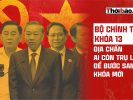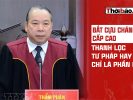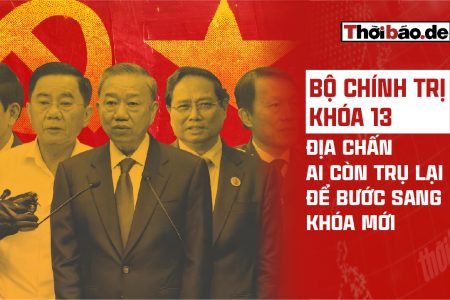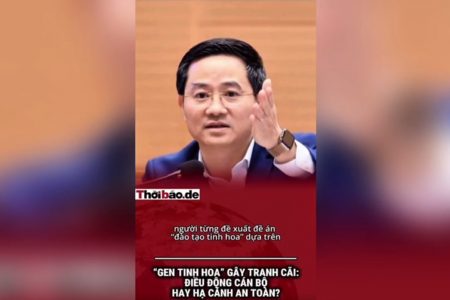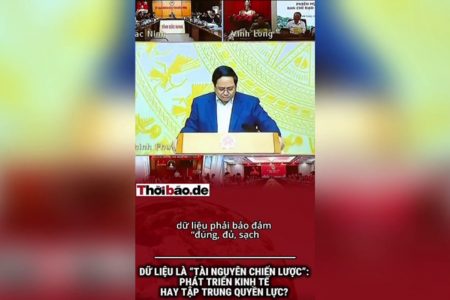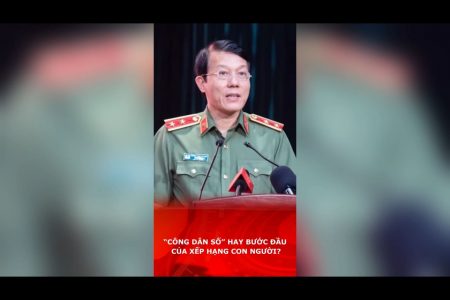A circular of Vietnam’s Minister of Public Security, effective April 3, 2020, sets out additional rules for prisons and forbids prisoners from doing a variety of things.
According to the content of this document published by the Vietnamese newspaper on April 1, „Male prisoners are prohibited from shaving their heads (except for cases of illness with the opinion of medical officials), or having beards and mustaches. Acts of homosexual and sexual relations between prisoners or with other people, tattooing on their bodies or other people are also completely banned.“
What was noticed by the foreign press – as noted in the DPA bulletin dispatched from Vietnam on the same day – was the „ban of committing suicide„.

Specifically, prohibited acts are: „Suicide, self injury, physical destruction or helping others commit suicide, self injury, physical damage; beating, threatening, bullying, controlling, torturing or humiliating others; appropriating or destroying, or damaging property and objects of detention facilities, their own or others; arbitrarily contacting with visitors or other people.“
It seems the circular wants to mention many evils called „gangs, eagles“ in prisons in Vietnam, so it has „banned beating, threatening, bullying, controlling, torturing, humiliating people.”
Underground economic activities in prisons are also stated: „Prohibition of trading, exchanging, borrowing in any form between prisoners or with each other.“
Exchanging books and publications that are considered „anti-regime“ in prisons is also prohibited, though this seems to have been applied throughout society. „Storing and using books, newspapers and documents with unhealthy content; disseminating culture and ideology with reactionary or depraved content; using scriptures, expressing religious beliefs and religions teachers at the wrong place, at the time prescribed by the detention facility,“ Zing News page quoted the circular as saying.
Responding to this new circular, Phil Robertson, Deputy Asia Regional Director of Human Rights Watch said: „The Vietnamese Ministry of Public Security does not understand that sending someone to prison does not mean deprivation of all his rights, regard him as inferior to man (less than human).“
Vietnamese newspapers, including that of the Ministry of Public Security, have publicly mentioned the situation of gangs, „prison“ cells having the right to superpower over prisoners.
In August 2017, the Ho Chi Minh City court tried an ‚eagle‘ named Lai Van Hoai who restrained prisoners from the detention house of Binh Chanh District Police after being given the position of head of the chamber.
„Here, Hoai himself set the rule, those who violate or voluntarily do wihout asking for permission, will be beaten, tortured in different ways such as pressing his head into the water or human feces,” according to the Zing site.
Although the defendant „submerged and beat to death“ a fellow inmate, the defendant was only sentenced to 15 years in prison by the court for intentionally causing injury.
According to the Phap Luat newspaper in April 2019, over two years earlier, in the detention center of Phan Thiet City police, an eagle, Le Trong Sang, broke skull of an inmate and caused the person’s death.
After this murder, in 2019, the court prosecuted Lieutenant Nguyen Thanh Ton, the prison officer for irresponsibility causing serious consequences.
Le Trong Sang, „a senior criminal“ in Binh Thuan province’s criminal community was sentenced to 13 years in prison.
The Committee to Protect Journalists (CPJ) on March 30 launched the #FreeThePress campaign to call for an unconditional release of all imprisoned journalists to ensure their safety during Covid-19 pandemic.
CPJ is a non-profit organization based in the United States that promotes media freedom around the world.
Over the past four years, the CPJ annual census has found that at least 250 journalists are imprisoned for doing their jobs. CPJ thinks this is a record high.
Still according to the Committee to Protect Journalists, those journalists who now have the potential to face death because the World Health Organization said inmates are particularly vulnerable to Covid-19 because of their inability to isolate themselves in prison. In addition, prisoners are often denied medical treatment.
Chief Executive of the Committee to Protect Journalists, Joel Simon, said that the disease caused by the coronavirus is spreading rapidly through prisons. Therefore, the CPJ urges world leaders to act quickly and decisively to free all the journalists behind bars, as a matter of life and death.
Nguyen Thi Kim Thanh, the wife of journalist Truong Minh Duc, who is currently being held at Prison Camp No. 6 in Thanh Chuong district, Nghe An province, expressed her delight at CPJ’s call.
„Also looking forward to calling on the United Nations, human rights networks, or newspapers, radios and Vietnamese community abroad to make my husband released, get out of prison, free like normal people.“
“It was a dream from the past until now. In general, my husband was imprisoned very unjustly. It will be great if Vietnam’s government releases my husband and other prisoners of conscience. That is what we are most looking forward to,” Mrs. Nguyen Thi Kim Thanh expressed.
Truong Minh Duc was born in 1960, was an independent journalist, an independent union activist and a member of the Brotherhood for Democracy. He was sentenced to 13 years in prison and 5 years of probation for subversion under Article 79 of the country’s Penal Code.
According to Kim Thanh, in the current situation of the Covid-19 pandemic, she is very concerned about her husband’s health: “Because of this pandemic, it is now the case of my husband in a prison camp. So harsh that I have not been able to visit my husband for a few months, I feel impatient, I don’t know what my husband’s health situation is like. Feeling very worried, insecure. The outbreak affects the economy, all things difficult. All of our families are miserable because there is no work, no money, difficulties in taking care of the family, and then send money and food supplies to my husband.”
Sympathy for Ms. Nguyen Thi Kim Thanh, Ms. Nguyen Thi Hue, sister of conscience prisoner and RFA contributor Nguyen Van Hoa, also shared the difficulties in visiting her brother who is being held at An Diem camp, province Quang Nam during this pandemic:
“Relatives of people in the prison are very worried, want to go to prison to visit their relatives to see if it is okay or not, in general a lot of anxiety is always haunting. At present, if the family wants to visit, the prison will not allow it.”
“In terms of visiting, it is also important to supply food for relatives. But at this time, the food supply was very difficult, and the prison restricted the supply of food. In general, from the second half of February to March, no visits have been allowed,” Ms. Nguyen Thi Hue said.

Therefore, Ms. Nguyen Thi Hue felt very happy when the human rights organizations still spoke out to help the prisoners of conscience in general and in the case of Nguyen Van Hoa in particular, she said: “Very happy but what whether it happened or not is important. According to the family members, it is not possible to expect that Vietnam will release them. Hopefully during this time the government will take care of Vietnamese citizens, first of all on human life and safety for everyone. We are especially looking forward to the Vietnamese government’s attention on that issue.”
In a statement released on March 30, CPJ also published a petition and an open letter to world leaders demanding immediate release of imprisoned journalists. The campaign will feature videos from previously imprisoned journalists. The campaign will culminate on World Press Freedom Day, May 3.
From the perspective of a writer, freelance journalist Ngo Nhat Dang expressed her support:
“I think the CPJ’s call is very necessary and should be done. I do not understand how the Vietnamese government will react because we have not heard from the news so we still have to rely on the government. I believe the probability is very small, just not as blatant and brutal as in China because the Vietnamese government does not have the power, power and finance as in China but we all see Vietnam as a copy of China.”
According to Dr. Nguyen Quang A, a civil society activist in Hanoi, not only political prisoners and prisoners of conscience but also other prisoners also need to be concerned.
Dr. Nguyen Quang A said: “I think it is really important to call for the release of all political prisoners, even the prisoners who are about to be released. Because actually in this plague situation, prisons are the places most likely to spread the disease and very dangerous. This is a claim, and in Vietnam whether or not it meets, I think the probability of their release is very small because the Vietnamese regime sees journalists and political prisoners even more dangerous than Covid-19. Because the regime thinks they are dangerous for its ruling role. So I cannot believe that they will answer that call.”
The U.S. State Department on March 11 published the 2019 National Human Rights Report, condemning the human rights situation in Vietnam in 2019 in a variety of areas.
Specifically, the US identified violations of the Vietnamese government on issues including: abduction, arbitrary detention, torture of detainees, unfair treatment of key prisoners.
According to statistics of the Journalist Protection Committee released late last year, Vietnam jailed at least 12 journalists in 2019 and is one of the top 10 countries in the world for repressive measures against government critics.
Thu Thuy from Hochiminh city – Thoibao.de (Translated)


















